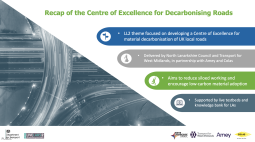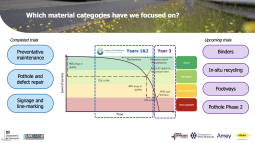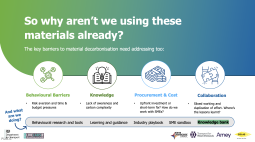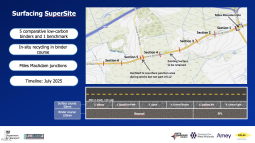Live Labs 2 blog - an update from the North Lanarkshire project
This month the Live Labs 2 project update from Elaine Nicol, Road Maintenance Manager at North Lanarkshire Council. Elaine reflects on a busy few months for the project and looks ahead to 2026.
A summer of trials, insights and innovation
It has been a busy and exciting Summer and Autumn for the Live Labs 2 Centre of Excellence for Decarbonising Roads. With a sharp focus on delivering meaningful trials and gathering robust data, we’ve made significant strides across multiple fronts, from bio binders and pothole repairs to carbon tools and innovation sandboxes.
We continue to monitor and test our Pothole trials, which saw over 100 potholes and patches repaired across six sites in North Lanarkshire. These trials compared four low-carbon materials against traditional hot rolled asphalt and cold mix. The first technical and carbon evaluation reports are now being reviewed, and early feedback from operatives has been invaluable in shaping our understanding of material performance in real-world conditions.
Supersites and Signposts
One of our headline activities this summer has been the Surfacing Supersite on the B7066. This 2.1km stretch of road has become a real-world testbed for several different low-carbon surfacing materials, including:
- GiPave
- Styrelf bio-PMB
- Warm Mix HRA
- UltiPave Bio
- and HardiPave
As well as in-situ recycling of the road’s binder course to a depth of 250mm using the calcined clay stabiliser method by SPL and Regen by Colas.
The Super Site was completed at the beginning of August and each 300m section is being monitored for performance, durability, and carbon impact with further testing like coring and FWD to be carried out in late November.
Sadly, we were unable to trial Lignin and Carbon Light as planned as they have specific temperature compatibility requirements however, we hope to trial Lignin and Carbon Light on another part of the network before the LL2 project ends.
This trial will identify the best low carbon material that equals the longevity of traditional HRA with the benefits of cutting CO2 emissions.
As part of our project we have also trialled Jerol signposts, made from recycled glass composite, as a sustainable alternative to traditional posts. Installed on Stirling Road in February, these posts are now being monitored for performance and carbon impact. If results are positive, North Lanarkshire Council may consider transitioning to Jerol posts for high-speed roads. It’s a simple switch from business-as-usual, but one that could have a big impact and we look forward to sharing updates on this in due course.
Another exciting development for our team has been the rollout of the FHRG Carbon Leadership Programme (CLP) Toolkit across all Live Labs. This tool simplifies carbon baselining and material profiling, making it easier for teams to assess the environmental impact of their work. It’s already proving useful in our evaluations and will be central to our final reporting.
Sandbox SMEs
On the innovation front, the Barriers to Decarbonising Roads Sandbox (BDRS) has gained momentum. Our partners at Safetytech Accelerator interviewed many stakeholders including Transport Scotland, National Highways, Amey and several local authorities, and identified more than 200 innovations.
From these, 17 SMEs were shortlisted, and the final six were selected. These SMEs were paired with industry mentors and began collaborative work to tackle procurement and adoption barriers face when introducing their innovations to the market. The sandbox proved to be a successful space for open dialogue and industrial research, which helped us understand why promising innovations sometimes fail to gain traction. As a result of the BDRS, we carried out the first ever trial in the UK of EcoPals EcoFlakes, which uses recycled plastic polymers as a bitumen replacement in surfacing materials.
We’ve also been busy on the communications and knowledge-sharing side. The Future Foresights report has been published, and the Local Authority Industry Playbook is in final review. Wireframes for the online Knowledge Bank were completed, and we hosted its showcase launch on 29th October which was well attended.
It offers Local Authorities and end users the chance to provide vital feedback on the tool, giving us the opportunity to make any final adjustments or improvements that are required. We are also continuing to map carbon calculations to make the platform as useful as possible. Trial protocols and the innovation log have also been published, ensuring transparency and consistency across the programme. Please add your own case studies and share best practice here.
Collaboration and thinking ahead
In terms of technical evaluation, we continue to collaborate with the University of Nottingham and other campuses to conduct accelerated life testing on rejuvenators and preservatives, as well as post-trial analysis of the Supersite materials. These evaluations will feed into our final suite of reports, which are scheduled for publication in the Knowledge Bank in the coming months.
In summary, the last few months have been a turning point for Live Labs 2. From planning and piloting in year one to full-scale trials and evaluations in year two, to showcasing our Centre of Excellence for Decarbonising Roads Knowledge Bank in year three, the insights we’re gathering now will shape the final outputs of the programme and, we hope, influence how roads are maintained and decarbonised across the UK. It’s been a team effort, and I’m proud of the progress we’ve made.
Further information
- For more information on ADEPT Live Labs 2: Decarbonising Local Roads in the UK, please look at the Live Labs 2 section on the website
- You can find further information on the North Lanarkshire Live Labs 2 projects here
Author
- Elaine Nicol, Road Maintenance Manager at North Lanarkshire Council




